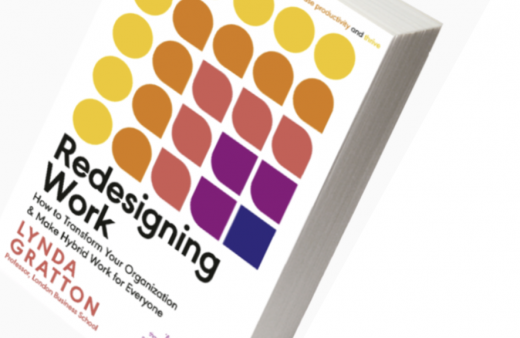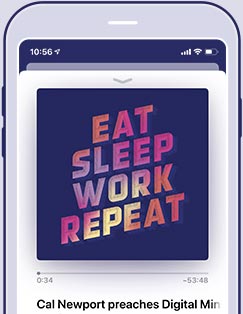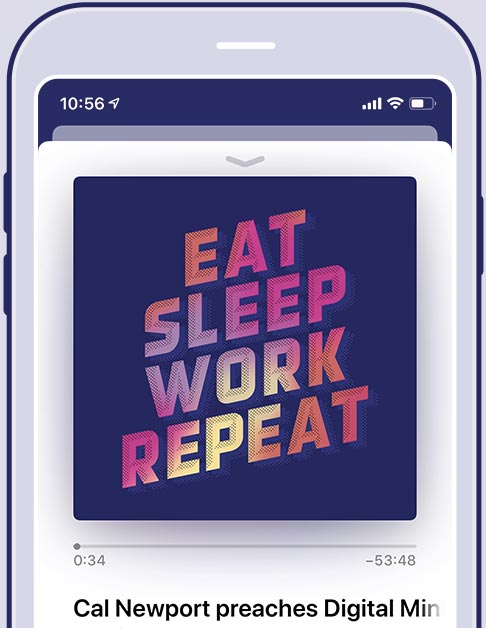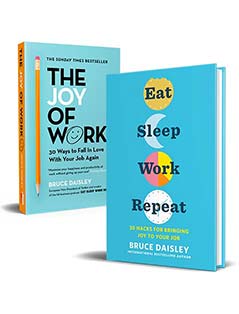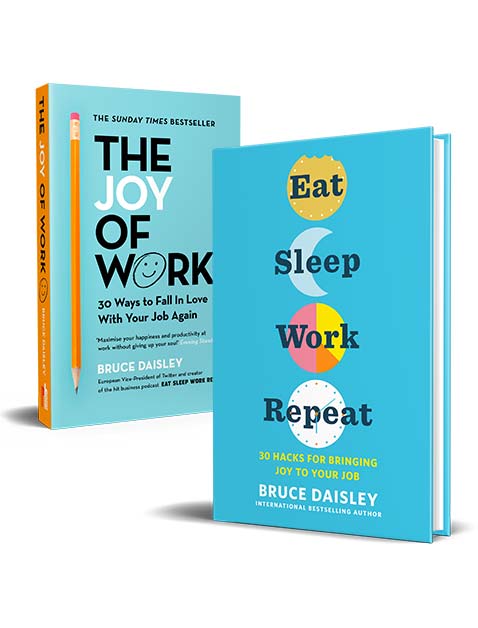The future of work? “The manager as a therapist”
Isabel Berwick is a writer and podcaster who focusses on the evolving state of modern work. I’ve celebrated her podcast Working It many times here (here’s her specials on the 4-day week for example, or her special on meeting-free days was essential listening). I love its ability to react rapidly to the biggest news stories of the moment and to drop a snackable episode midweek.
I talked to her about her opinions on modern work, going deep on the rapidly changing world of employment and where we’re going next.
Isabel has a brand new book out, The Future Proof Career, which she says is for everyone who doesn’t read books about work but wants to be better at navigating it.
Recent episodes you might have missed
- The importance of trust at work – and why it’s on the decline
- Charles Duhig on how to be a supercommunicator in your job (and your home life)
- Can improvements to culture fix a broken NHS trust?
- The Big Ange effect at Tottenham Hotspur
- Frances Frei on the importance of training managers
Transcript
Isabel Berwick
I’m Isabelle Berwick. I’m an FT journalist and the last two and a half years I’ve been the host of our Working It podcast about the workplace management and leadership.
Bruce
Yeah, I first encountered working it when I was at an event, I think post pandemic, I’d sort of ventured out one into one of the, the nascent events when people were just getting their footing back and someone came over to me and said, uh, Oh, I listened to your podcast, but I’ve started to listen to working it more and more. It was like, okay, thank you very much. Um, so they, they gave me a perspective of that. I’d never heard of it until that point. And I think it was brand new at that point, but it’s give you a really unique perspective, hasn’t it? Because I guess if we were to.
to look at that period from the end of 2021 till now, probably more has changed in the way that we work in that period. And most definitely there’s been more uncertainty. I think any of the heuristics of leadership were, you know, learn what works and then implement it. And all of those firm footings have been…
made it a touch less steady. And I wonder what your take is about the state of work currently.
Isabel Berwick
Yeah, I think a lot less steady is exactly it. I quite often call it squidgy or unformed. It’s in this sort of, if I say liminal space, that probably sounds a little bit pretentious, but I don’t mean it to be. It’s not one thing or another. And I don’t know which way it’s gonna go. I think there’s a lot of things up for grabs. So it makes it a very interesting time.
Bruce
there’s a really interesting perspective, I guess, that you’ve got that the Financial Times has such a window into an audience with the most senior people in the UK and in senior positions in business. I wonder, do you get to witness there the gap between what leaders are thinking and maybe what the rest of us are experiencing on the workforce? Is there a gap between that leadership group – the boardroom and the rest of us.
Isabel Berwick
Yeah, I think there definitely is. I mean, I wouldn’t say this is across the board, but there are certainly a lot of leaders who’d like a lot of people to be in the office a lot more than they are at the moment. And I’m sure, you know, but a lot of that is off the record. So you won’t get people saying that out loud, except for very, you know, outspoken people, people in the financial services industry, you know, famously Goldman Sachs, if you’re in a very coveted job, you know,
people like Goldman Sachs can demand people come back to the office five days a week. In a lot of sectors where there’s a talent scramble, they can’t do that so much. But I think there is a massive disconnect between people who want to go back to the old ways and people who want much more flexibility. And it’s not actually evidence -based. A lot of the evidence doesn’t, there’s no drop -off in productivity with hybrid work, particularly. Remote work is perhaps something different.
But I think that because as humans, we have such a strong bias towards trusting people we can actually see in front of us. It takes a lot of work to get over that. And I think for a lot of leaders, that might be a step too far.
Bruce
It’s such an interesting paradox, isn’t it? Because one of the things that the management class has really preached forever, really, but certainly throughout my experience of them is that we should be braced for constant change and we should be ready for reorganizations, for disruption. If you’re not willing to embrace constant change, then maybe there’s not a role for you right here. And actually the people who’ve been most…reluctant to embrace the change impressed upon us in the last four years have been that leadership group. And it seems somewhat paradoxical that to some extent they’ve had change brought to them and they’ve found discomfort in it.
Isabel Berwick
That’s a really good point. I think you’re right. I mean, humans don’t like change. None of us like change. And there’s a whole, as we know, there’s a whole sector of people called transformation consultants or some other similarly pretentious titles who do organisational change because it’s so hard. So the, I suppose from a leader’s point of view, the less change, the better, you know, bThey just want everything to be the same. We want minimal disruption. So I think accepting that change is happening and embracing it is a really big shift that I think a lot of leaders haven’t been willing to make yet.
BruceYou mentioned the financial sector and your own office is in the middle of the financial sector. And I get a sense through your writing that you might do more than three days a week in the office. You mentioned Mondays and Fridays. How many days do you do yourself?
Isabel Berwick
I record most days, so I’m in the office probably four or five days a week, more than most people. But I quite often, and this is something we’ve talked about, I think some of my colleagues did a big piece of work about commuting the other week, Andrew Hill and Emma Jacobs. And the pattern of commuting is not that people are staying at home all the time or being in the office all the time. It’s that if you live in the inner commuting area, you might go to the office for part of the day. And that’s new. And I do that quite often now.
Bruce
Right, right.
Isabel Berwick
you might go in for the morning for meetings and to have lunch and then you might come home in the afternoon. And that’s been a little bit under the radar. I’m not sure it’s officially sanctioned in many workplaces, but I think that is how a lot of people are working now. I’m not saying in financial services, it’s perhaps more rigid in a lot of those kind of offices, but certainly in creative industries, that’s a pattern that seems to be emerging.
Bruce
Where do you think we are on this? Where do you think we are? It’s so strange, isn’t it, that we’re having the same debate all the time. I read something this week that was the first time that I thought, okay, maybe we’ve reached a degree of settle down because it was a suggestion that bosses have broadly accepted the days that we’re working in the office now seem to be where they recognize that we’re going to end up. But where do you think we are? You’ve mentioned the difference in sectors.
Isabel Berwick
Hmm.
Bruce
Do you think we have reached the equilibrium of how we’re using the office in a different way?
Isabel Berwick
For the minute, I think yes, although there’s a huge knock on effect in terms of footfall in city centers and places where offices are concentrated being so low, Monday and Friday in the city, particularly Friday in the city of London is really dead. And that has a huge effect for the businesses. So I don’t know how that’s going to impact long -term. I think that’s a town planning and, you know, placemaking issue. Can we bring more people in for leisure?
But certainly in terms of how we work, I think we have settled down, but I don’t know, there might be another shift to come. I mean, that’s part of the joy of what we do.
Bruce
one of the things that one of my favorite things that you did on working it was the special that you did on the four day week. And you sort of went, I think over five episodes, you went really intensely, a fabulous bit of reporting, talking to organizations that had done it and looking at the differences. And one of the things that really strikes me is my friends who have a typical office job, they describe to me what their Fridays look like now. And you know, we’ve
Isabel Berwick
Mm -hmm.
Bruce
really clearly established, I think that if you get a team’s meeting come to you for four o ‘clock on a Friday, it feels like a violation of your human rights and you feel like there’s something wrong, but it’s going to be beyond that. People I know who maybe do Tuesday, Wednesday, Thursday in the office, they say Fridays have almost got no meetings to them. They’ve developed a very different rhythm that people find themselves on a train somewhere mid -afternoon on a Friday.
How do you think those things have impacted the way that we’re working? But one of the things I’ll give you a supplemental question is that one of the things we’ve been obsessed with over the last two or three years is burnout. And actually that predates the pandemic. But I just wonder if the way that we’ve evolved to working might start to see the reduction in burnout. And while we haven’t migrated to a full four -day week, Fridays look
decidedly different the rest of the week. What’s your take from a far better perspective than I’ve got?
Isabel Berwick
I think this, what we might call the extension of the summer Friday, which was something that was happening in a lot of industries before the pandemic, where you knock off at lunchtime in summer on a Friday, particularly the publishing industry, I think started that. And that has really crept into loads of different industries, but quite often under the radar, there are some companies like I interviewed the head of Kellogg’s in the UK, they have an official summer Friday policy all year round. If you’ve done all your work, you can knock off.
at lunchtime on Friday. And I think that’s huge, actually. That’s a great incentive. But so many more people are doing, as you described, this kind of under the radar, sneaky Friday. Is it going to help burnout? I don’t know, because burnout is, we’re preparing a series on burnout, actually, and it isn’t always linked with too much work. It can be linked with other things, as we know, there might be pressures in your personal life. It might be a bad manager.
that I think burnout’s often been linked with overwork, but it’s not always the same thing. So I think it could be really helpful. And there are other companies I’ve heard from who are doing things on Friday, like professional development. So suggesting to staff that they spend Friday afternoon reading professional journals or catching up on videos and training. I don’t know if that’s hopeful or not hopeful, but it’s a…
It’s an easing into the weekend that we didn’t have before the pandemic. And I think it’s fantastic.
Bruce
Yeah, it was, it was really noticeable, I think. But the one thing that came out of your, your special on the four day week was the notion that you can’t just drift into it. If you want to do things decidedly just in the four day week, um, work intensity goes up, work needs to be structured in a different way. It felt like sociability was, was one of the things that declined that to some extent people were more transactional with each other. There was no room for the chit chat.
Sometimes we find ourselves fetishizing. And I guess then the version of work that we’re heading towards is something closer to what you said about Kellogg’s there. That, you know, your job on Fridays is to wrap up all your loose ends and that means you’ll be working all day if you’ve got a lot of loose ends, but it might have a slower pace if you’ve earned it. That feels like more the version of working that we’re going to.
Isabel Berwick
Yeah, I sort of fear, I don’t know what you feel about this. I kind of feel the four day week is a is an interim state probably. It’s a it may not catch on in a widespread way, but it’s been an interesting thing. It may not catch fire, but as a trend, it shows us where we’re going. And I think the trend is probably towards a much more flexible week in terms of when you work. You know, I heard someone on your podcast talking about.
What was it? The chrono working, you know, when, you know, maybe more if we’re a morning person, we work more in the morning. And if we’re an evening person, we work more in the evening. And I think that’s where it’s going. And more, if I say individualized, it might even be part of employee experience programs, you know, that you have an individualized work program. The four day week is a bit of a one size fits all, and it doesn’t fit all. But I think it’s a really useful way of
looking at the future of work and what might be possible and springing off from that.
Bruce
One of the things that comes from that is that quite often the things that are popular with employees prove to be very unpopular with managers and not senior leaders, but like middle managers that, you know, more flexibility is seen as incredibly popular with the workforce. And then the people whose job it is to implement it or to make sense of it or deliver results from it feel frustrated by that.
I wonder if you could just share your perspective of the role of managers and how the role of managers is evolving. I saw you talk about the role of managers is going to have less authority to it. And I’d love to sort of get the vision of the fully fleshed out version of what a manager looks like in the future.
Isabel Berwick
Yeah, I’m slightly worried about managers because I think there’s so much pressure on them, you know, from above, they’re caught in the middle and from below. And I’ve been thinking a lot about this mental health crisis that’s upon us now, particularly among younger workers. And I think the manager as therapist is probably something that is going to have to happen if, if employers want to keep their staff well and in work and productive, you know, to be brutal.
managers are going to have to be really well trained in supporting people with mental health conditions. Now some manage, some firms are really good at this already, but most aren’t. And I think most people haven’t really clocked the scope and the seismic shift of this Gen Z mental health crisis. It isn’t going away anytime soon. And you can argue as much as you like about whether, you know, we all had mental health problems, but we didn’t talk about them, older millennials and Gen X, but that doesn’t make any difference because Gen Z expect to be heard.
expect to have accommodations made. And you know, that’s probably a good thing. But I do think the role of the manager as therapist is a very real future unless employers decide to separate that off and have, you know, have pure management as a performance and process and career driven thing, almost like a coach. And then you have a separate kind of therapy arm within the company where people can get
Bruce
Hmm.
Isabel Berwick
you know, tailored mental health support. And there are some big companies already have in -house therapists and counselors. But I think, I think the sheer enormity of the manager’s job is like, how long is a piece of string? It just keeps getting bigger and bigger and more and more manager, you know, managers don’t have training. And this is what I’ve written about in my book. You know, what’s the figure? 80 % of people are accidental managers with no training. I mean, it’s shocking. So a bad manager ruins everything for the team, for their own mental health.
for the purpose and productivity of the company. I really struggle to find out, to understand why companies don’t realize this is running a business 101.
Bruce
It’s so interesting, isn’t it? Because if you combine that 80 % figure, that’s really, is like so astonishing and so huge, you know, you’d expect something maybe that was a degree of magnitude smaller. But not only that, but quite often when organizations are talking about cutting out costs or getting rid of red tape, the first thing they do is take out the layer of middle managers. I think, you know, in all of the tech firm layoffs.
middle managers were disproportionately hit. And so you end up with no middle managers who, if they previously had six people reporting to them or 10 people have now got 20 people reporting to them. Now, the context of being a therapist in that situation is impossible, isn’t it? Like you’d have to say, we’re going to go to the other model that you said, which is mental health is dealt with, but it’s by someone over there and who’s going to be sympathetic for20 minutes a week, but he’s not in your line management.
Isabel Berwick
I mean, the whole lack, the whole no manager thing I think is really interesting. Um, and there are some companies that manage without managers, but again, a bit like the four day week, it requires an incredible amount of process and transparency and preparation. And, you know, the idea of not having a manager and being self -directed is so appealing to many of us because autonomy is what we all want, but the reality of it to implement.with fewer managers, it’s often so badly done.
Bruce
The autonomy thing is a really interesting point to think about. I would really love you to talk about how maybe ambition has changed and how we’re thinking about our jobs in a different way. And maybe there was a time when someone trying to get more autonomy wouldn’t necessarily have been top of their agenda when they joined work. It would have been just get your head down, try and do as much as possible. But one of the things I think you say is that…
We’ve seen ambition take different forms and sometimes that ambition is I want to work less or I want to see more of my family. How do you think ambition has changed?
Isabel Berwick
think it’s changed really profoundly. The pandemic was part of that, but I think there is a wider shift as well. Because I think there’s an understanding that our work doesn’t love us back. And if you place all of your ambition in a kind of corporate context, you’re going to be disappointed, we’re all going to be disappointed anyway, but it really magnifies the disappointment. So I think during the pandemic, the idea of what ambition is really widened out.
because people spent more time at home, because they saw what an alternative might be. And I’m thinking, and particularly in knowledge work here and professional work, I think as only as, and also the idea of a career that just goes upwards is probably over. And I’m not sure how that shift happened. I think partly it’s because of the sheer weight of numbers of women in the workplace now. Over time, women have modeled something that is different from a traditional.
career path, mid 20th century kind of mad men style career path. So I think even though we probably didn’t realize it at the time, and it’s been, it was very hard for women in workplaces. I do think it has enabled everybody to think more flexibly. Obviously, there are lots of exceptions and some employers are really difficult. But even if you’re not consciously thinking about what is ambition or what is my ambition, the choices that are open to you in a corporate career.
are often a lot more flexible and you know and you might be prepared to accept a job that isn’t an obvious um pay right you know pay right it might be a sideways shift because you’re trying to acquire skills and i think that’s really only come to the fore in the last five years or so i don’t know what you think i think that is a pandemic thing and also a tech thing you know we’re all suddenly waking up to the fact we need to be a little bit more savvy about ai so everyone’s now panicking and doing lots of ai training which of course
probably in five years time will be useless. The hype is real.
Bruce
Yeah, I guess that brings us on to like trying to navigate a world that we can’t even imagine what’s coming up and trying to work out what’s coming. One of the things that I’m interested in is the different generational take on how they would deal with a different world. So one of the things you often hear from senior leaders is that they go back to their own experience when they first started in work.
And they try and relate that to current workers. And so what you often hear from them is that, well, younger workers, they should be in the office every day. Cause in my day, I loved coming into the office and being around people. And quite often, if you chat to people who are younger workers, Gen Z or young millennials, they’ll say, I live so far away that it costs me 30 pounds to get to the office. And it cost me an hour and a half to get to the office. And while I enjoy having team interactions, it’s not worth that. And, and.
Often senior leaders can’t relate the world of today to their own experiences. That then sort of poses big questions about any of us thinking about the future of work and how work is going to develop. Do you see big generational gaps in the way that we appraise what’s happening in work and where we’re going?
Isabel Berwick
Yes, huge generational gaps. And I think Gen Z, they’re influencing upwards as well as across. So we older workers learn a lot from younger workers. And I think if you’re resistant to that, you’re going to be on a hiding to nothing. So anybody who’s saying, this is how we did it in my day, really, that’s a very time limited situation. I think Gen Z are fascinating. I’ll try to find out as much as I am. And I’m both my kids are Gen Z.
Neither of them wants a corporate job. They don’t want to work for the man. So I think that’s one thing, you know, that the people will job hop and we’re already seeing this data, aren’t we, that younger workers are job hopping a lot more because they won’t stay if they don’t like it. And I, yes, I think, yes, they are already. And I think that will probably continue unless there, you know, many people keep saying if there’s an economic crash, it’ll be.
Bruce
Do you think more than in previous you do?
Isabel Berwick
really difficult, but I mean, people were saying if things tighten economically, everyone’s going to be back in the office, but I haven’t seen any evidence of that. People are resistant to all sorts of things. So I think they just have a, I mean, the big difference is tech, you know, is the fact you can find out what other people are doing and you can tell other people if your organization is no good. The power of TikTok and Instagram has changed everything. And I think any of us who are older managers or workers,
don’t really, you know, because we grew up before the internet was, or social media was everywhere, we just don’t have that perspective. And it has changed everything because they know what’s going on in other companies or in what their friends are doing at all times. And we worked in a bubble when we first started work. And that’s why that I think that’s why they know there’s better stuff out there and are prepared to move for it. And I think good on them actually.
Bruce
Yeah, that asymmetry of information. It’s actually interesting that it hasn’t taken hold more than it has. So you mentioned there TikTok helps people see inside of the jobs, but inside big tech firms, quite often there’s been Google Docs shared where anyone can go in and post their salary, not say who they are, but say what level they are, what ethnicity and gender they are. It’s been this extraordinary thing because the companies have always forevermore benefited from the asymmetry of information. They could tell you, you’re really well paid for your grade. And to some extent, it puts us in a box where we think, thank you, sir. Uh, you know, I’m, I’m in the top 1 % of my grade, you know, I shouldn’t ask for any more. In fact, when these, these, um, the pieces of sharing of sort of radical candor have come out, radical transparency have come out. We’ve, we’ve seen that it’s something more than that. And you mentioned that there, I’m just surprised there hasn’t been more of that.
breaching the asymmetry that it hasn’t been more a version of glass door that just comes out and tells, let’s anyone share their salary because it’s like you say, when those things happen, they’re so potent.
Isabel Berwick
I think the salary sharing is really interesting and the word, you know, transparency, I think is a key word for the future of work because I think people will demand more transparency, however old they are. I think once we’ve started to see this salary sharing, why hasn’t it taken hold more? I don’t know. My take would be that we are still slightly ashamed. You know, we slightly attach our worth to our salaries and that’s part of, you know, I’ve shared salaries with people.
Isabel Berwick
I work with or friends and they haven’t shared back and I haven’t, I realize it’s because, you know, there’s some, there’s a, there’s an element of shame or guilt or, you know, shame if you’re not earning as much guilt, if you’re earning more. And I think that’s so hardwired and maybe it’s not hardwired in Gen Z. I don’t know. I’m not one, but certainly until the last five years, salary was just not something that was ever discussed. So I really hope that.
That last thing is busted open because transparency about salary is so huge. It could really affect a lot more change internally in workplaces, I think.
Bruce
Yeah, and the organizations that do share their salaries, you mentioned someone who shares his salary, but the organizations that do share, I know an organization called Buffer and Basecamp does it. And when I’ve gone and looked at the financials of those organizations, they’ve not been really high performing. There hasn’t been a aspirational level of achievements that you’d go, wow, this high flying firm has got this incredible approach to…
to sort of sharing and making everyone equal. Actually, they’re sort of kind of underperforming and rather small firms. And so it’s just an interesting one. There’s no one, I often struggle with the question when people say what organizations are getting it right? And, you know, these teams that are getting it right and some organizations that are doing some things right, but broadly I sort of subscribe to what you say that, I think you say all cultures are dysfunctional. And,
Isabel Berwick
Yeah.
Bruce
And when you get down to it, most companies have got several things that aren’t right as well as things that are.
Isabel Berwick
Yeah, I think radical candor is slightly different. Radical transparency, that kind of total transparency is different from, I don’t know, team level or grade level transparency. I think there’s a way of making it work without, because actually there are downsides to total transparency. It can cause terrible upset in teams because quite often you’ll have somebody who’s been brought in on a higher salary because they’ve come from outside and they’ve been tempted in and headhunted and they might well be earning 20 or 30 ,000 than the person they’re sitting next to.
Isabel Berwick
And that is hard actually. And I don’t envy managers who are dealing with those kinds of situations. So that’s perhaps, I mean, I’m not saying that’s not an argument to know what your colleagues earn at all, but you know, there are lots of kinks and dysfunctions in the system, as you say.
Bruce
thinking about work and workplace culture. Um, one of the things that people often say is that work isn’t as much fun as it used to be. And there’s not as much enjoyment in culture. And, you know, firstly, that’s an intriguing idea, how we create fun, where fun lives. If fun is just about having friends at work. But one of the things that’s proved a barrier to creating a cohesiveness at work.
is a growing CEO pay gap, the sense that the sort of the leader class and these, the rest of us, what’s your take on whether work is fun and whether those bigger factors are actually forcing a fragmentation of workplace culture.
Isabel Berwick
I think there’s an element there of we often tend to think work was fun when we were young because we look back with nostalgia and as you get more senior it becomes less fun or as you get older and you have other commitments outside work it obviously becomes less fun because you can’t just nip off for a swift half at the pub after work. So I do, I just think a lot of that is to do with ageing honestly. When I think back to the things we used to get up to when I was in my 20s and working on the medical press it was great fun but I mean…
I still really enjoy work. I think I’m probably atypical because of the kind of workplace I’m in. I, you know, every day talk to incredibly intelligent, interesting people. And I have a lot, you know, we laugh a lot and I learn a lot and I feel really privileged. But I think after the pandemic, there has been this sort of knocking back because you’re not in the office so much or in the workplace so much. There is a knocking back of fun.
But actually, is it the fun that we miss or is it organized or enforced fun that we felt we had to be obliged to go to Debbie’s leaving drinks, even though we hardly know Debbie and contribute 10 pounds to her leaving gift that we can ill afford? I’ll tell you, that is one thing that has happened since the pandemic, this online leaving gift situation. So shame it, you know, you have to give. Whereas before it was some mankiela envelope that was doing the rounds and you could easily just slip in a pound or two.
Isabel Berwick
Now you will, you know, you have to, there’s a sort of, there’s a whole, maybe I should do an episode about this. There’s a whole unspoken etiquette around these online giving things. So, you know, it is enforced fun in a much more structured way. So maybe, yeah, it maybe it is less fun. I don’t know. I think I find absence makes the heart grow slightly fonder. I, I traveled halfway across London to see a colleague in the pandemic who I hadn’t seen for a year. And I was pretty tearful when I met her.
You know, I’d really missed her.
Bruce
Yeah. Yeah. It’s just, it’s just really interesting, isn’t it? Trying to separate the things that are personal from the things that are universal to the things that, you know, in the grand scheme of things, societally, if people depend less on their work relationships and more on the real life relationships they’ve got in their neighborhood or with their family, societally, that is a good thing.
You know, work shouldn’t be just our only identity, but it’s just whether you can do a like for like replacement. And if people are losing those relationships at work, but then living a fairly sort of isolated life in a flat somewhere, then that just contributes to a more impoverished way of living. And so it’s just interesting to try and separate the universal from the individual on these things.
Isabel Berwick
I think a lot of it is down to managers, you know, again, poor managers, but if you can foster some sort of team spirit and maybe that is going out for pizza once a month or, you know, something I used to do with my team, not once a month occasionally, but you know, it’s just a, just a little something and not everyone has to buy in, but offering it or, or just reading the room and seeing what the team might like.
Bruce
Hmm.
Isabel Berwick
I think makes a huge difference. There is a place for workplace socialising because I think it does help a team to bond. But I think the enormous amounts of sort of enforced fun that used to happen before the pandemic, I don’t think anybody’s missing that really.
Bruce
Yeah. You’ve been fortunate that you’ve had this incredible window into the way that we’re working and the organizations that are doing it best. And you’ve turned all of this into this sort of fabulous book, The Future Proof Career. Who’s the book for, do you think, when you’re thinking about a prospective reader? Who do you think would get most value from it?
Isabel Berwick
So I’ve written the book very specifically for the kind of people who don’t normally buy business and management books. So I have so many books on my desk at the FT and so many of them are dry and they’re aimed at the kind of people who might want an MBA or already got an MBA. And I just thought, where is the book for the people that want to enjoy work as part of their wider life to have a good career, but they might not want to be the CEO to get on with their colleagues, to work out why their managers such a
ask and how to get around that, how to become a manager and be better. So just very practical stuff. So it covers a lot of ground. And I also wrote it for people like me who were in the later part of their careers, because I think there’s a whole emerging and says, oh, there’s a long chapter about late life blooming. And I think that’s an emerging area where employers have traditionally been ageist as well as sexist. But I think we may be coming out of that now and people are starting to make the most of people’s expertise.
So I guess I hope for everybody.
Bruce
Having a field guide for dealing with difficult colleagues is always a perennial value as well. These people can haunt our weekends, can’t they? We just sort of go home, we’re thinking about this person who just keeps saying these slightly toxic things to us. So having a field guide to deal with difficult people is always welcome along the way as well.
Isabel Berwick
I learnt a lot writing actually, I realised how much of a bad listener I was. And I also realised how much I’d overreacted in my career. So when I’d had bad managers, I was trapped in a kind of parent -child dynamic, constantly trying to please these managers who were never pleased. And I now, and I hope I’ve written in the book and I now realise that you just have to step away from that and try to encourage adult to adult.
I don’t think I ever realised how much baggage from our childhoods we take to the office. I think that’s one of my key takeaways. Because, you know, we have all this, I think we imagine that we’re someone different at work, you know, a better, we put on our clothes and we’re a better, even if we’re on the zoom, we’re a better version of ourselves. But actually, we’re bringing the same old stuff every day. And, you know, if you’ve had a controlling mother or, you know, authoritarian father, you’re going to react.
Bruce
Go on, in what sense?
Isabel Berwick
at work to the people who remind you of those people and overreact often in ways that are not helpful to your career. So I think doing the podcast and writing the book has helped me to really clarify how difficult it is to navigate work as people.
Bruce
That’s such an interesting question because I think in my head, if you ask me, the version of me at work was quite different to the version of me at home in the sense that I’m more patient at work or I’m more tolerant of things that I don’t agree with. But maybe I’m not. Maybe. I mean, because I can definitely think of plenty of times when colleagues would definitely not describe me as…
being tolerant or patient. Maybe I just express it in a slightly different way, but it’s the same person. That’s good. That forces me to delve into my own psychology a bit more because that’s most definitely there are certain attitudes I had to, to authority or to rules or to that must have come from somewhere deep inside my psyche.
Isabel Berwick
I mean, we’ve all been in meetings where people have been visibly sulky. I mean, it’s like sitting in a classroom. It’s extraordinary. I mean, it’s quite fun. I mean, it’s fun to write about and talk about, but I really hope that people can get something out of it and try to, I mean, it makes all of our lives better if we have a good time at work.
Bruce
And you mentioned that you’re working on a series about burnout. So how do you work? How does the working agenda plan come together? Do you just find things you’re interested in and go after them? Or how does the creative process work?
Isabel Berwick
So I’m very lucky now I write. So my job is hosting the podcast and I write a newsletter weekly for FT subscribers called Working It as well, which is quite a lot of work. So that’s probably half my week. It comes out on a Wednesday afternoon. So the first half of the week is very much that. And then the podcast is, I have a producer called Misha Franco Diwala and we have an executive producer and the three of us work together.
to think of ideas and trends. So I get everything coming into my inbox. I know what the trends are. I listen to a lot of podcasts, including yours, Bruce. You know, I know what’s going on and I sort of think what, what should we be doing? And also we respond to things in the news. So for example, we put out a quick episode about Peg to Boeing’s issues. Why do employees not speak up when they see something wrong? So we can be nimble. So it’s fun. It’s a nimble process and it’s a mixture of news related.
topics and relevant workplace topics, if I can put it that way.
Bruce
I love it. Well, a long time listener, first time caller. So it was lovely to chat to you today and best of luck with the book. I’ve been really grateful for the chance to talk to you.
Isabel Berwick
Oh, Bruce, it’s been lovely. Thank you so much for having me on. I’m a long time listener too, so neutral appreciation.




